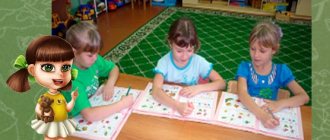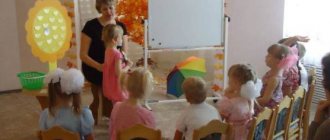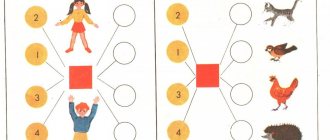One of the most significant activities in preschool age is play. Moreover, the child begins not only to take part in actions, but also to obey certain algorithms, rules, etc. This allows you to complicate the conditions over time, adding more and more new practical tasks.
Teaching numbers in a playful way can begin at 2-3 years of age.
Learning mathematics in a game
Educational games conducted by the parent with the aim of developing the child’s cognitive activity allow him to learn new knowledge and acquire the skills he needs in a simple and unobtrusive form. They perfectly develop fantasy and imagination, help the child remember and successfully put into practice forms of behavior. Thus, the child’s mental development reaches a qualitatively new level.
A game for a preschool child (especially when it comes to educational games) is not just entertainment. This is both labor and creative activity at the same time. Its role in the development of a child as an emerging personality cannot be overestimated. By directing and organizing the game, the parent can also include it in the pedagogical process, controlling all aspects of the child’s social development. A properly organized game is distinguished by the fact that it always has a specific goal, as well as the means necessary to achieve it.
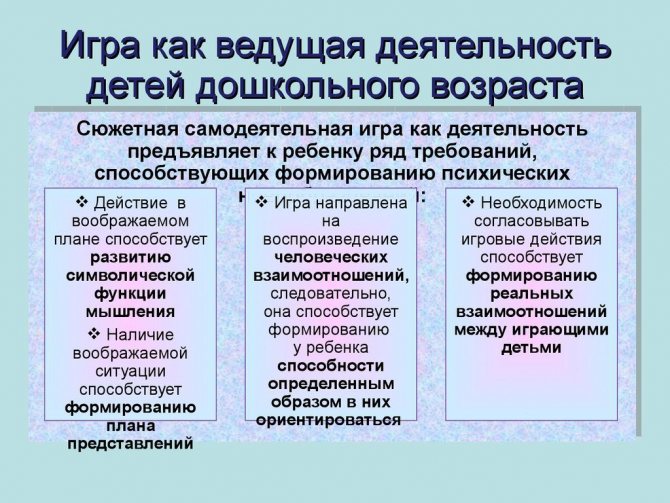
The role of games in teaching preschoolers
This is especially evident in didactic games, which, among other things, have the goal of developing the child’s basic cognitive processes: attention, memory, and a general stock of ideas about the world around him. And despite the fact that the educational value of the didactic game is extremely small, it is indispensable for the prevention of socio-pedagogical neglect, preparing the child for school, etc.
Mastering mathematical concepts should be carried out strictly step by step. You need to move on to learning new material only after the previously learned material has been completely consolidated. In addition, the development of mathematical abilities and skills in preschool children must obey the strict principle of conformity with nature (each age has its own load).
Principles of organizing play activities for preschoolers
- A game for a preschooler should be based on generally accepted standards of morality and morality, and respect for the child’s personality.
- In no case should gaming activities in any way degrade the dignity of participants (including losers).
- A didactic game should help a child to comprehend the world around him as deeply as possible, assimilating the laws that it obeys.
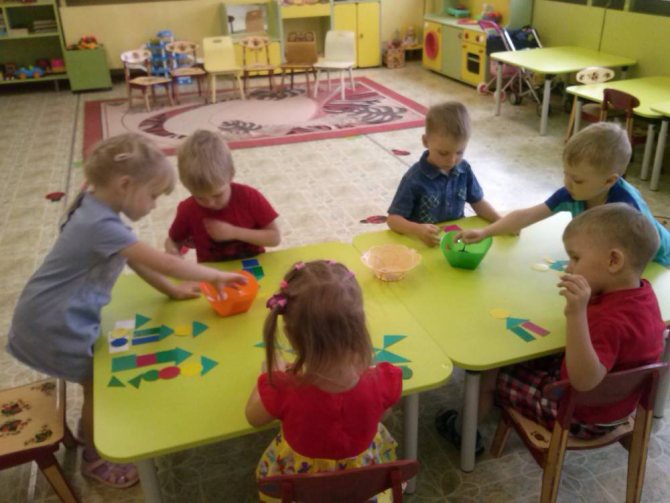
. In particular, the purpose of didactic games may be the development of mathematical abilities in preschool children. It will be much easier to do this through gaming activities.
How to use educational games to teach your child the basics of counting
Modern pedagogy is developing at a rapid pace. And more and more schools are beginning to use developmental technologies using computers in the learning process and recruit experimental classes. And the same can be safely said about family education.
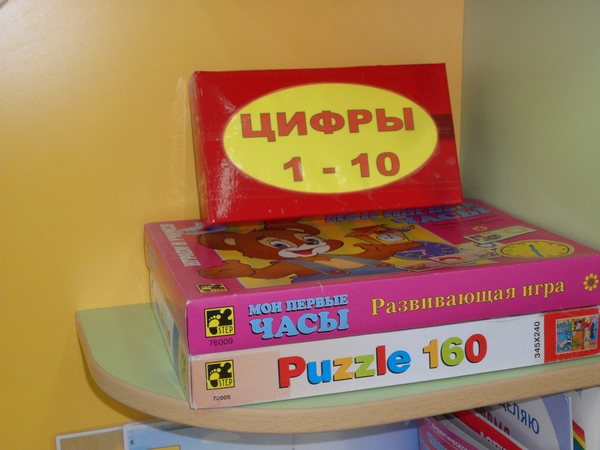
Didactic games help develop mathematical abilities
It is no coincidence that a child’s early introduction to high technologies: computer and information literacy is a requirement of the modern rhythm of life. That is why, already in the preschool period, it is necessary to pay maximum attention to the formation of mathematical concepts and the basics of computer science. All these skills will definitely be useful to your child at school.
What should a child know by the time he enters first grade?
Despite the fact that mathematics is one of the basic school subjects, as well as the basis of many sciences that a child will begin to study in the future, it is this discipline that in many cases causes considerable difficulties for children. This is largely due to the fact that the mathematical mindset, which greatly facilitates the child’s perception of information of this type, is not inherent in all children.
However, there is a strictly defined system of knowledge and mathematical concepts that must be formed by the time the child enters school.
- Ability to count from zero to ten in both ascending and descending order
- Developed skill of recognizing numbers in a series (even if they are placed separately)
- Formed ideas about cardinal and ordinal numbers
- Formed ideas about the previous and subsequent numbers within ten
- Knowledge of basic geometric shapes and the skill of recognizing them (understanding the features that distinguish a triangle, circle, square, etc.)
- Having an idea of the whole and the parts; the ability to divide an object into 2 and 4 equal parts.
- Ability to use sticks, strings and some other measuring devices to estimate body parameters such as length, width and height
- The ability to compare objects into categories of more-less, higher-lower, wider narrower.
Category knowledge game
Intellectual development of children of senior preschool age through FEMP
Municipal budgetary institution
additional education
children's creativity center in Temirgoevskaya village
“Intellectual development of children of senior preschool age through FEMP”
Additional education teacher
education FEDORTSOVA E.P.
Temirgoevskaya village, 2020
“Intellectual development of children of senior preschool age through FEMP”
Preschool childhood –
a very important period in the life of children.
It is at this age that every child is a little explorer, discovering with joy and surprise the unfamiliar and amazing world around him, and in order for every little person to feel confident in the future, to be able to find the right way out of the current situation, to make a quick decision, it is necessary to deal with it intellectual development
. Raising and teaching children in the “Firefly” studio is educational in nature and takes into account two areas of children’s acquisition of knowledge and skills: the child’s extensive communication with adults and peers, and the organized educational process.
«Smart childhood
“lays a good foundation for the intellectual activity of the individual.
Preschool age
- a favorable period for the development of intelligence, it is at this time that progressive changes occur in many areas, mental processes (attention, memory, perception) are improved, personal qualities are actively developed, and on their basis - abilities and inclinations.
Preschool age
– this is the beginning of a long road into the world of miracles, knowledge and discoveries. It is at this time that children lay the foundation for further learning. And the main task of the teacher is to teach them not only to count and read, but above all to think.
Development of intellectual abilities of preschool children
– one of the pressing problems of our time. Preschoolers with developed intelligence remember material faster, are more confident in their abilities, adapt more easily to a new environment, and are better prepared for school.
The basis of human intelligence
, its sensory experience is laid down in the first years of a child’s life. In preschool childhood, the formation of the first forms of abstraction, generalization of simple conclusions, the transition from practical to logical, the development of perception, attention, memory, and imagination occurs.
Intellectual abilities in preschool children
develop better if you adhere to, as psychologists believe, the principle of a high level of difficulty in your work. When a child does not face obstacles that can be overcome, their development is weak and sluggish.
Each child is talented in his own way, each has significant creative potential. Intellectual abilities are not a talent, but a skill that one can develop.
So what is the intellectual development of a child?
Child's intellectual development
– the sum of knowledge and skills, the ability to assimilate and apply this knowledge in solving non-standard situations. But it should be understood that the RRI is not predetermined. Therefore, we teachers who are interested in RRI must direct the child’s energy in the right direction.
Intellectual development of children
– is of particular importance for preparing children for school. After all, it is important not only what knowledge a child has by the time he enters school. And is he ready to acquire new knowledge, is he able to reason, fantasize, draw independent conclusions, and create ideas for essays, drawings, and designs?
The leading role in intellectual development belongs to systematic intellectual education.
a huge role in mental education and development of intelligence .
It is known that Mathematics
– a powerful factor in the intellectual development of a child, the formation of his cognitive and creative abilities.
Children are amazingly active and inquisitive; they simply, like a sponge, absorb everything that happens around them.
Development of elementary mathematical concepts
- This is an extremely important part of the intellectual and personal development of a preschooler. And the success of his further education largely depends on how well and in a timely manner the child is prepared for school.
In teaching children to develop elementary mathematical concepts, I set myself the goal
– to create in pupils an interest in mathematics, to develop the ability to think independently, reason, analyze, understand its significance for subsequent learning, to give the child the feeling that he can cope, that he can learn not only the particular concepts of mathematics, but also general laws. Create a situation of success, and most importantly, experience the joy of overcoming difficulties.
Mathematics
– has a unique developmental effect.
Mathematics is the queen of all sciences
! And it’s hard to disagree with this, because the world around us exists in space and time. It is tangible, quantifiable, measurable. We use knowledge of mathematics every day.
She clears her mind!
Its study contributes to the development of memory, speech, imagination, and emotions.
And although mathematics is one of the most difficult subjects, our students should never learn about it, because our goal is to teach the child to comprehend this science with interest and pleasure.
I believe that teaching children mathematics in preschool age contributes to the formation and improvement of intellectual abilities: logic of thought, reasoning and action, flexibility of the thought process, ingenuity and ingenuity, and the development of creative thinking.
Practice has shown that preschoolers show cognitive interest in mathematics only when they are intrigued and amazed by something unknown to them. In this case, the information looks interesting, almost magical, in their eyes. Our task is to make FEMP classes entertaining and unusual.
The educational standard of the new generation sets new goals for preschool education that require new educational technologies.
A modern preschooler, to successfully study at school, must be able to:
1. Ponder.
2. Gain knowledge independently.
3. Think.
4. Make decisions.
5. Present the product.
Modern educational technology, more than ever, relies on the intellectual development of a preschooler. Game learning fully corresponds to this concept.
Everyone loves to play: both adults and children.
A preschool child is a person who plays, therefore the standard stipulates that learning enters the child’s life through the gates of children’s play.
The relevance of the topic is due to the fact that a child’s personal qualities are formed in active activities, and above all in those activities that are leading at each age stage and determine his interests, attitude to reality, and the characteristics of relationships with people around him. In preschool age, such a leading activity is play.
What is a game?
Play is an activity in which a child first emotionally and then intellectually masters the entire system of human relationships.
A game -
What could be more interesting and meaningful for the guys! This is joy, knowledge, and creativity. This is what a child comes to our studio for.
Features of the game for preschoolers:
— the game is the most accessible and leading type of activity;
- play is an effective means of shaping all aspects of a child’s personality, his moral and volitional qualities;
- all psychological new formations originate in the game;
-game is an important means of mental education of a child, where mental activity is associated with the work of all mental processes.
It has long been proven that every child from birth is endowed with enormous mental potential, which, under favorable conditions, develops effectively and enables the child to reach great heights in his development, and only in play does the child joyfully and easily, like a flower under the sun, reveal his creative abilities and knowledge. In the game, perception, thinking, memory, speech are formed - those fundamental mental processes, without sufficient development of which it is impossible to talk about the development of the child’s intellect.
A game
- This is a natural, humane form of education for a child.
By teaching through play, we teach children not how it is convenient for us to give educational material, but how it is convenient and natural for children to take it. Without play, normal development of the brain and body is impossible. To understand the nature of play, its amazing potential, is to understand the nature of a happy childhood.
Children are the creators of the present and the future.
This is the charm of the game.
For preschool children, play is of exceptional importance:
Play is learning for them,
Play for them is work,
Play for them is a serious form of education.
Preschool age is the age of play.
In my work on the intellectual development of children, I use a comprehensive gaming method. It is based on educational games. “play” with children
into mathematics. But teaching mathematics to preschool children is unthinkable without the use of entertaining games, tasks, and entertainment. Children are very active in the perception of tasks - jokes, puzzles, logical exercises. They persistently search for a solution that leads to a result.
Of all the variety of entertaining mathematical material in preschool age, didactic games are most used .
The formation of mathematical concepts in children is facilitated by the use of a variety of didactic games.
Didactic games
– games in which cognitive activity is combined with gaming activity. On the one hand, a didactic game is one of the forms of influence of an adult on a child, and on the other hand, a game is the main type of independent activity of children.
They allow preschoolers to expand their knowledge, consolidate their ideas about quantity, size, geometric shapes, and teach them to navigate in space and time. That is why I pay great attention to didactic games in the process of FEMP; this is primarily due to the fact that their main goal is educational.
Namely, a game with educational elements that is interesting to a child will help in the development of a preschooler’s cognitive abilities.
Didactic games for the formation of mathematical concepts are conventionally divided into the following groups:
1. games with numbers and numbers.
2. time travel games.
3. games for spatial orientation.
4. games with geometric shapes.
5. games for logical thinking.
Independent play activity.
This type of activity is extremely important for the development of a child, since in independent games the ability to improve skill and intelligence is trained, and most importantly, an unlimited opportunity to invent and create is revealed.
Do you want your children to be capable and talented?
Then help them take the first steps on the steps of creativity, but... don’t be late and, while helping..., think for yourself!
By teaching children through play, I strive to ensure that the joy of play turns into the joy of learning!
Learning should be joyful!!!
Conclusion
: So, in my opinion, without the use of didactic mathematical games, the development of cognitive activity, logical thinking, memory, creativity and other personal qualities is impossible.
Their diversity and accessibility help us successfully plan and implement assigned tasks, both in collective and individual work with children, which is the key to the successful intellectual development of children of senior preschool age
and, as a consequence, their subsequent schooling.
Downloaded from www.znanio.ru
Does a preschooler need computer science?
Despite the fact that today computer science is an optional discipline that is not included in the category of compulsory subjects, some ideas about computer science should be formed in the child by this time. For example:
- Knowledge about algorithms.
- An initial introduction to computers.
- Understanding the program used to control a computation.
- Basic skill in using algorithms and logical operations using And, Or, Not commands.
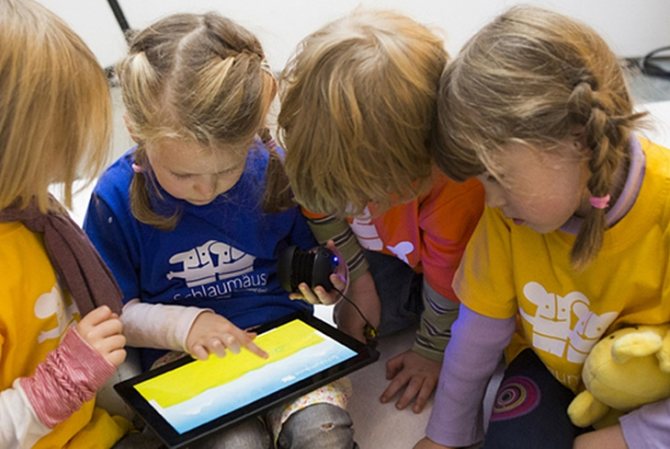
Initial acquaintance with computers for preschoolers
Basics of mathematical concepts in preschool age
Mastering mathematical knowledge is impossible without the child understanding such fundamentals of science as quantity, number, etc. However, given that for a child they remain abstract for a long time, understanding even the simplest categories at first glance can be significantly difficult.
In these cases, it is possible to develop mathematical abilities in preschool children through play activities.
Simple didactic games give the child the opportunity to understand what a number is and form adequate spatial-temporal ideas. In order for games to have maximum effect, it is necessary to build them on the basis of the following principles.
For a child to effectively master the skills acquired during games, it is necessary that visual material be used in classes: bright pictures, toys, cubes, etc. This is explained by the fact that the voluntary attention of preschoolers is not yet well developed. And to activate it, it is necessary that the object be distinguished by such qualities as brightness, novelty and contrast. In addition, favorite toys used during classes will make them even more interesting and exciting.
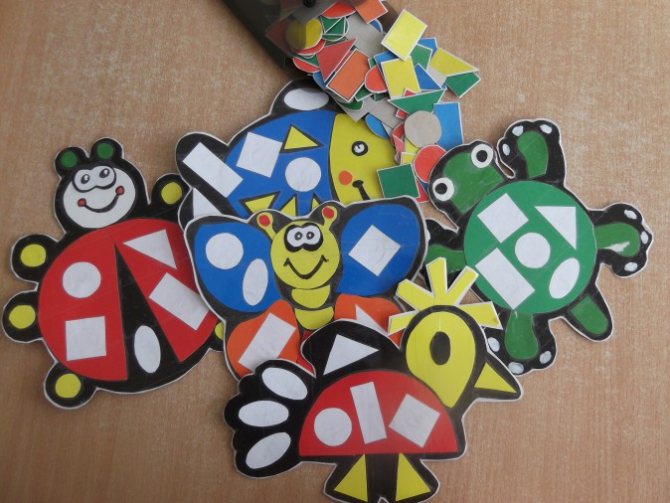
Geometric cards develop spatial understanding
For example, if a child has some difficulty in counting, you can put in front of him several geometric shapes painted in different colors and sequentially count the objects in each of them. In order for the child not to become attached to specific things and to be able to transfer the acquired knowledge to different objects, it is very advisable to use new toys in the learning process, supplementing the existing stock with new ones.
In everyday life, you should also encourage the child to name the number of objects on the table, the number of cars in the yard, children on the playground, etc.
After a child learns to count, parents will be able to significantly expand his stock of everyday knowledge by explaining the purpose of certain objects. For example, thanks to counting skills, it will not be difficult for a child to explain why a person needs a watch or a thermometer. And subsequently understand by the clock, at any moment, telling the time or measuring the temperature.
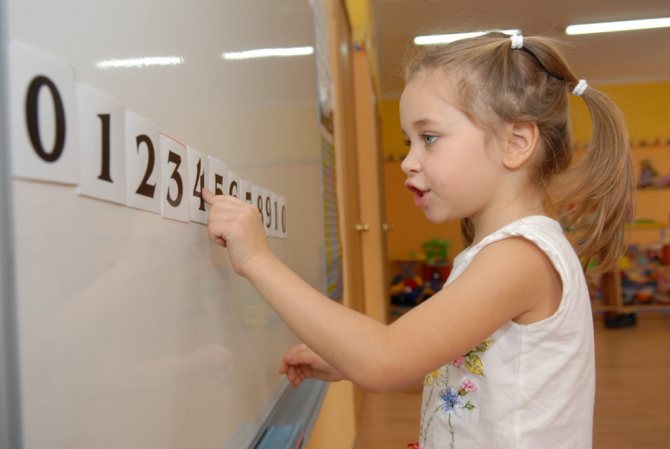
By school almost all children can count
A fairy tale is also an indispensable tool for developing mathematical concepts in a child. You can use lesson elements in an unobtrusive form, including them in the process: for example, when reading a fairy tale, you can ask the child how many characters he counted in it; how many animals, birds, trees are shown in the picture of the illustrated book. It is also useful to invite the child to compare characters, pointing out their similarities and differences; indicating who is more or less of them, higher or lower, etc. Operations with numerals can be performed within the first ten.
A significant role in the development of addition and subtraction skills in the future will be played by the child’s ability to divide a whole object into parts.
In order for the child to effectively learn the concept of quantity, as well as the previous and subsequent numbers, you can play with him, for example, by asking him to guess the number within certain limits and giving him hints with words more or less. This will allow the child to better navigate numbers and compose complete number series in his mind.
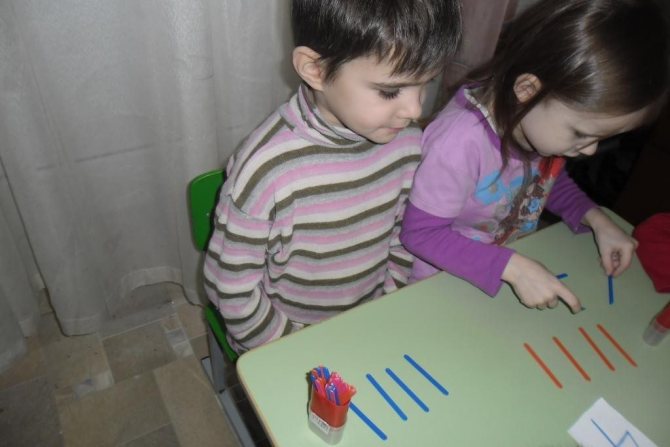
Children love to play with counting sticks
Ordinary counting sticks can also make a significant contribution to the development of a child’s mathematical understanding.
Here are just some examples of didactic games using these items:
- Lay out the counting sticks in front of the child and invite him to first choose any two, and then distribute them on two sides. After this, the child must say how many sticks are on each side.
- Over time, the conditions of the game can be slightly complicated by asking the child to divide four sticks into two parts. And then suggest other ways to divide the four sticks into two groups. Subsequently, the number of sticks can be increased to 10. Increasing the number of sticks will give the child more scope for imagination, offering more and more new ways of division.
- You can make simple geometric shapes from sticks, thereby explaining to your child what a triangle, rectangle, or square is. Once your child has an understanding of angles, you can explain the differences between shapes in more detail. And also invite him to fold them from sticks on his own.
- Over time, classes on forming simple geometric concepts can be complicated by asking the child to fold, for example, a rectangle with a side of 3 or 4 sticks. Or make different shapes from the same number of sticks.
- It is also useful to offer the child a fixed number of sticks, from which he could assemble two figures, or figures that have one common side.
- Counting sticks are also great for making simple numbers and letters. Using this method also prepares the child well for working with the lined surface of a notebook.
Formation of elementary mathematical concepts in preschoolers through didactic games
Formation of elementary mathematical concepts through didactic games in preschool children
For the mental development of preschool children, the development of mathematical concepts, which are so necessary for understanding the world around them, is essential.
Exploring the world, the child performs various actions, as a result of which he explores, compares, establishes correspondence, counts, measures, groups, remembers, reasons and explains his actions. Mathematical concepts serve as a means of a child’s intellectual development, his cognitive and creative abilities. Visibility, consciousness, activity, accessibility and measure, scientific character and taking into account the age and individual characteristics of children, systematicity and consistency, strength of assimilation of meanings, connection between theory and practice, a variable approach, this is the content completeness that is relevant for the development of the child. The widespread use of specially educational games is important for awakening preschoolers’ interest in mathematical knowledge, improving cognitive activity, and general mental development. A didactic game is one of the forms of educational influence of an adult on a child, which has two goals, one of them is educational, which is pursued by the adult, the other is playful, for the sake of which the child acts. Play is not only pleasure and joy for a child, which in itself is very important, but with its help you can develop the child’s attention, memory, thinking, and imagination. While playing, a child can acquire new knowledge, skills, abilities, and develop abilities, sometimes without realizing it. The following tasks were identified: - Development in children of imaginative and logical thinking, mental processes (perception, attention, memory, thinking, imagination), cognitive interest in elementary mathematical concepts with the help of didactic games. — Enrich children’s vocabulary based on familiarization with the didactic game. — Create conditions that facilitate the identification and maintenance of selective interests, the emergence of independent cognitive activity in children through play. — Enrich the subject environment, creating conditions for the full education and development of students. Constant analysis of students’ achievements is a prerequisite for working with children. Diagnosis helps to determine the real picture of a child’s development, and it is possible to solve the problems of learning, development and upbringing in unity. Preschool children experience problems with temporal and spatial references, confuse colors, have difficulty grouping or comparing objects, and do not use prepositions and adverbs in speech: to the right, above, from, next to, with, about, in, on, behind. The inclusion of children in direct educational activities is slow; cognitive motivation is not sufficiently formed. Having studied this problem, we decided to overcome the identified difficulties in children with the help of didactic games. According to the Federal State Educational Standard for Additional Education, the main principle of learning is play. It is through play and project activities that the individuality of each child should develop and his interest in learning about the world should be formed. According to the Federal State Educational Standard for Educational Education, educational games allow you to solve problems in various educational areas. Didactic games greatly contribute to the development of cognitive interest in children. They make any educational material exciting, cause deep satisfaction in children, create a joyful working mood, and facilitate the process of assimilation of knowledge. For preschool children, a didactic game is study, a game for them is work, a game for them is a serious form of education. To solve the problems, didactic games can be divided into the following subgroups: - Didactic games for familiarization with numbers and teaching counting. (“One, two, count”, “Dominoes”, “How many” and others). — Didactic games for the formation of ideas about the size of objects. (“Matryoshka dolls”, “Close the doors in the houses”, “Pick up a patch”, “Find and name”, “Who lives where”). — Didactic games to familiarize yourself with the shape of objects. (“Pick by shape”, “Find an object”, “Geometric lotto”, “Applique”). — Didactic games for the formation of temporal and spatial concepts. (“Labyrinths”, “Where I’m going”, “What has changed”, “Travel”, “When it happens”, “Find the mistake”). Didactic games are perceived by children as a natural continuation of their play activities; they did not notice that learning was taking place, the children moved around the group, looked at toys, pictures, and diagrams. The games are held in an atmosphere of goodwill; a situation of success is created for each child. The main task is to include all children in the active and systematic learning of the fundamentals of mathematics. To do this, it is necessary to rely on the individual characteristics of children, their attitude to this type of activity, the level of their mathematical development and the degree of their understanding of new material. An individual approach makes it possible to ensure the active participation of all children in common work, which leads to the development of their mental abilities, attention, and prevents passivity in some children. Not only educational, but also educational tasks are carried out. Didactic games with a wide range of visual aids are used (cards, emblems, geometric shapes, counting sticks, handouts). The attractiveness of visual aids, the widespread use of gaming exercises and didactic games - all this creates a good emotional mood in children. Games with counting sticks are offered, for example, “Making geometric shapes from counting sticks.” We introduce children to the ways of building, joining and rebuilding one form from another. By working with sticks, children are able to imagine possible spatial and quantitative changes. The game “Who can collect it most quickly” is used to consolidate knowledge of objects in ascending or descending order. To develop logical thinking and attention, play the game “What’s missing?”, “What’s the count?” In the didactic game “Like - Not Like”, children notice the signs of objects by color, shape, size, material; observation, thinking, speech develops. Spatial representations are constantly expanded and consolidated in the process of all types of activities. Children navigate in specially created spatial situations and determine their place according to a given condition, perform the tasks “stand to the right of the chair”, “stand so that there is a chair behind and a table in front.” To consolidate knowledge about spatial orientations, the didactic game “What has changed?” is used. Children also reinforce their spatial orientation in the game “Where will you go and what will you find”, “The Bunny’s Journey”. To achieve a better result, didactic games are carried out with the appearance of a fairy-tale hero. For example, the game “Find the Treasure,” where we go in search of treasure on a pirate ship; “In the Thirtieth State” we travel with Ivan the Tsarevich. In preschool age, children develop the elements of logical thinking. In order to develop children's ability to reason and make their own conclusions, games such as “Associations”, “Guess what they wished for”, “Help the cat get to the mouse”, and others are used. In our work, we use mathematical riddles with great pleasure. They provide invaluable assistance in developing independent thinking and the ability to prove the correctness of their judgments. We solve these wonderful riddles every day, relying on a card index of such tasks. Children really like to write riddles and problems themselves, and at the same time they perform complex mental operations. Children are also offered geometric figures to create planar images of objects, animals, and birds. Children are happy with their results and strive to do tasks even better. As a result, children began to cope better with all tasks and use prepositions and adverbs in their speech. For example, during morning exercises (counting exercises, spatial orientation), while walking (running, walking in a certain direction, classification, sizes, size and color), in work activities (table setting, preparing for classes), in role-playing games games (“Guests” - the ratio of guests and dishes, treats). The subject-developmental environment according to the Federal State Educational Standard for Preschool Education is defined as a system of material objects of a child’s activity that functionally models the content of his spiritual and physical development. In the creativity corner, sets of geometric shapes of different colors and different sizes are presented, from which children lay out patterns, coloring pages with numbers and geometric shapes. In the building games corner there is a sufficient amount of material for playing with children's buildings, which helps to consolidate ideas about size and shape. At the center of manipulative games there is a large number of didactic games with mathematical content, puzzle games, construction sets with small parts, construction toys, various measuring objects, games for attention, since we believe that an important condition for the effectiveness of teaching mathematics is the attention and perseverance of children. Board-printed, didactic games with mathematical content, various counting materials, helped children learn to select, combine, count, classify objects, and invent their own games. Thus, each child can try out their abilities, hobbies, and participate in collective mini-groups. We have the opportunity to organize independent and joint activities of children, develop their ability to experiment, search and find solutions. Children's experimentation is widely used as a teaching method . Children gain new knowledge and draw conclusions by observing the process itself. Experimental research develops curiosity and activates the child’s cognitive activity. Our role is to puzzle, include in search activities and increase the share of independence. All elementary experiments are carried out in an exciting way: work in a “magic laboratory”, meeting with a “fairy”. By playing with sand, water and natural materials, children developed their creative abilities and expanded their scientific and natural-mathematical understanding. We actively use various forms of physical activity to strengthen the physical and psychological health of children. During the day, preventive activities are carried out: morning exercises, outdoor exercises, sports games, finger exercises, physical exercises, walks, sports leisure activities, where children consolidate and master various mathematical concepts, learn to measure length, direction of movements, and understand instructions for spatial operations. To develop mathematical concepts, various mathematical entertainments are held: “New Teremok”, “Visiting a Fairy Tale”. All entertainment is based on gaming types of cognitive activity and the use of information and entertainment content. During the entertainment, children show intelligence, resourcefulness, the ability to work in one team, and coordinate speech with movements. We came to the conclusion that the inclusion of didactic games and exercises with mathematical content in various types of children’s activities (joint, independent, routine moments) made it possible to increase their cognitive activity and mathematical concepts. The place of the didactic game in the structure of classes on the formation of elementary mathematical concepts is determined by the age of the children, the purpose, purpose and content of the lesson. Thanks to the widespread use of educational didactic games in regulated and unregulated forms of work, children acquired mathematical knowledge and skills without overload and tedious activities. Children developed a keen interest in the process of cognition, they became more developed in the ability to think independently, in the ability to prove the correctness of judgments, general mental abilities, logic of thought, reasoning and action, flexibility of the thought process, ingenuity and ingenuity, and spatial concepts were developed and improved. With the help of didactic games, it is possible to concentrate the attention and arouse interest of even the most disorganized preschool children. During the game, children successfully master complex mathematical concepts, count, classify, and group. Our main goal is to raise children healthy, able to think, make independent decisions, and develop mental processes, which is the basis for successful schooling.
We recommend watching:
Didactic games - coloring pages to strengthen counting skills for children 3-5 years old Game technologies in kindergarten Game therapy for preschoolers Work experience as a preschool teacher. Role-playing games
Similar articles:
Methods for early teaching children mathematics
Games for teaching mathematics to children 3-6 years old
Poems for teaching children to count
Math problems games for preschoolers
Logic games in mathematics for preschoolers
Preparing your hand for writing. Working with notebooks
Before you start teaching your child to write numbers, it is necessary to carry out significant preliminary preparation with him. In particular, he must clearly understand what a notebook cell is, what its boundaries are, and find the corners, middle and sides.
After the child begins to freely navigate the lined surface, it will be possible to move on to drawing simple ornaments, for example, connecting opposite corners of the cage, or points located in the middle.
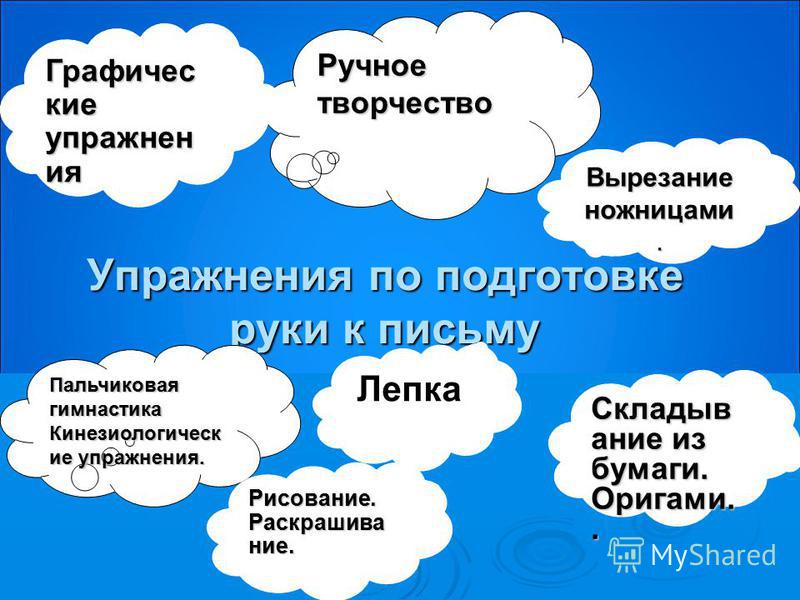
No matter how strong the parent’s desire to teach the child to write as quickly as possible and prepare his hand for writing numbers, it is very desirable that in one lesson he learns no more than one or two patterns. The benefit of such activities is not only that the child prepares to write more complex elements, but also perfectly develops fine motor skills.
Logic games in preschool age
The development of mathematical abilities in preschool children through gaming activities is impossible without the use of logical games. Among other things, logic games stimulate the child to look for non-standard and unusual solutions, develop creative thinking in him, and support his desire to continue learning.
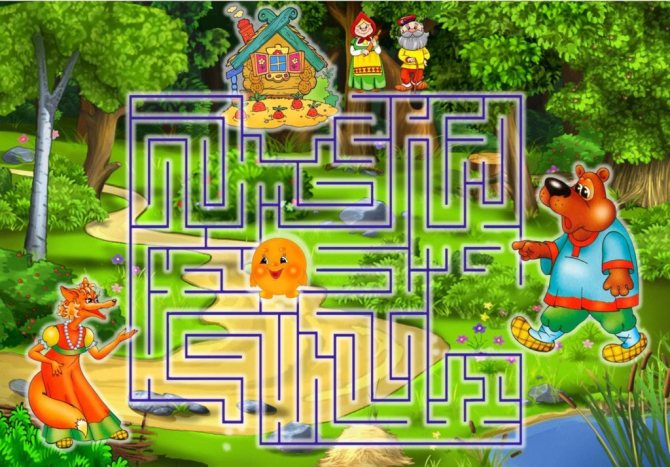
Logic game for preschoolers
Entertaining tasks are valuable because they unobtrusively lead the child to the conclusion that concentration and concentration are necessary to complete a task that is interesting to him. This makes it possible not only to develop thinking, but also to polish voluntary attention. This will give the child the opportunity to perceive the conditions of the task and look for a possible catch in it. Thus, the development of mathematical abilities of preschool children through gaming activities is carried out as unobtrusively and correctly as possible.
You need to read the problems out loud, slowly and clearly so that the child can draw conclusions from each sentence and understand it correctly. It is very undesirable to give the child too many explanations: he must independently assimilate the train of thought. This will greatly enhance the joy of discovery.
Simple and familiar riddles from childhood will also play an irreplaceable role in the process of logic development: this will give the child the opportunity to learn to identify the key features of objects and recognize them by them.
Games for mastering the basics of computer science
Despite the fact that computer science is still not a subject compulsory for study at primary school age, studying its fundamentals greatly contributes to the development of forms of abstract thinking. It also helps to master such actions as classifying objects according to certain criteria, ranking, distinguishing between the main and the secondary. The child begins to learn to assimilate established rules and strictly adhere to them.
To master basic concepts of computer science, you can use board games, which are sold today in all children's stores.
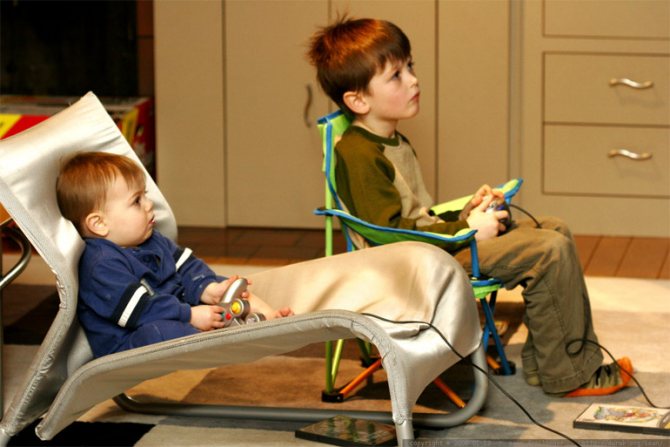
Computer games for preschoolers develop abilities
The meaning of most board games for children is quite simple: with the help of chips and a cube, the child moves around the playing field. Thanks to this, spatio-temporal relationships are formed, the ability to follow given instructions, and carry out sequential actions. The child learns the simplest conditions and algorithms. It is desirable that board games be complemented by a plot that is interesting for the child, thoughtful design and interesting graphics.
MAGAZINE Preschooler.RF
Development of mathematical abilities of preschool children through didactic games.The leading activity of preschool children is play. A didactic game is a verbose, complex, pedagogical phenomenon: it is a gaming method of teaching preschool children, a form of teaching children, an independent play activity, and a means of comprehensive education of a child.
In teaching preschoolers the basics of mathematics, didactic games are given an important place. Not much time is devoted to this area of teaching. I think it’s in vain. After all, through mathematics, children learn to think logically, reason, look for relationships, form quantitative, spatial and temporal concepts, and also develop thinking abilities, attention, and memory.
The relevance of this problem is caused by a number of reasons: the high demands of schooling, the abundance of information received by the child, increased attention to computerization, and the desire to make the learning process more intense. But practice shows that not all children have a mathematical mindset, not all have a natural attraction to the exact sciences, and not all children show interest in mathematics.
In order to help children develop mathematical abilities, to instill, if not love, then the importance of mathematics, it is necessary to create certain conditions:
- organize a subject-development environment in a group in which the game library is of utmost importance (well-chosen games contribute to solving educational problems and develop children’s interest in intellectual work, initiative and need for this type of activity)
- comply with such pedagogical principles as systematic and consistent, accessible and attractive, taking into account the intellectual and psychological potential of the child
- be competent in organizing and conducting didactic games.
Didactic games can be very different: games with numbers and numbers, time travel games, games for spatial orientation, games with geometric shapes, games for the development of logical thinking. BUT the most important thing is that they bring joy to children, that they are interesting to children.
I will give several examples of games that were made by me and the parents of my students. These were the games that children liked the most and used in independent activities.
1. "Find Your Friends"
Goal: development of attention, orientation in space, knowledge of geometric shapes.
Each child holds in his hands a geometric figure (circle, triangle, square) of a certain color (red, yellow, blue, green). On the command “Find a friend by color, by shape ,” the child must look at his figure and find a friend with the same figure or color as his.
2. "Collect the pizza"
Goal: consolidation of knowledge of numbers, accounts, quantities.
The players (up to 6 people) take the form in the form of a slice of pizza, choose a pizza recipe, and depending on the recipe, lay out the ingredients in the specified quantity. This game can also be used to study parts of a whole.
3. "Journey Through Fairy Tales"
Goal: to consolidate the ability to navigate in space, to introduce the concepts of “left” , “right” , “up” , “down” . Develop the ability to act according to the proposed scheme, based on guidelines. Foster a love of fairy tales.
The magnetic board depicts a map of a fairy-tale kingdom, with the houses of fairy-tale characters. The players' task, based on the schemes, is to visit one of the heroes, and who exactly can be visited according to one or another scheme will become known at the end of the journey. Magnetic bunnies help players along the way.
4. “Gather a bouquet for mom”
Goal: develop memory, attention, ability to take turns. Strengthen your knowledge of color.
The circles depict flowers (chamomile, aster, gladiolus) of different colors (red, yellow, blue). The circles are laid out face down on the table. One of the players throws a cube with colored edges and chooses a circle; if the flower depicted on the circle is the same color as the color on the edge of the cube, the player takes this circle for himself, if not, he puts it in the place where he took it. The one who collects the most flowers for mom wins.
The significance of these games lies in the fact that thanks to them, preschoolers actively master counting, use numbers, carry out elementary calculations visually and orally, master the simplest temporal and spatial relationships, and transform objects of various shapes and sizes. Playful activities contribute to the fact that children, without realizing it, are practically involved in simple mathematical activities, while mastering properties, relationships, connections and dependencies on objects and at the numerical level.
The conducted pedagogical diagnostics confirm the feasibility and importance of systematic and consistent pedagogical activities on the mathematical development of preschool children using didactic games.
| Next > |
